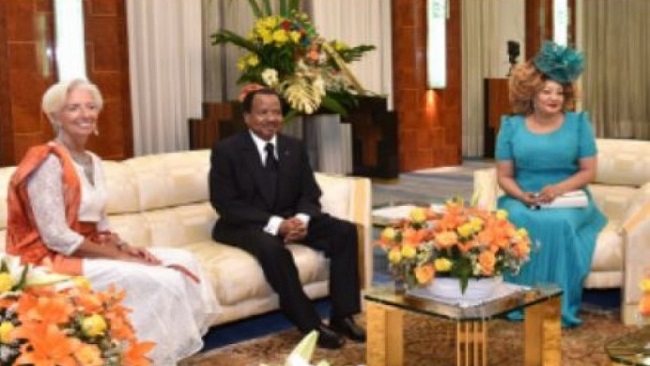IMF Executive Board approves US$ 156 million for Biya regime to address Covid-19
The Executive Board of the International Monetary Fund (IMF) today approved a disbursement of SDR 110.4 million (about US$ 156 million, 40 percent of quota) under the Rapid Credit Facility (RCF). This is the second emergency disbursement to the country since the onset of the COVID-19 pandemic, bringing total IMF emergency support since the outbreak of the pandemic to SDR 276 million (about US$ 382 million, 100 percent of quota). The new emergency disbursement will help Cameroon meet its urgent balance of payments and fiscal needs.
Since the approval of the first Rapid Credit Facility (RCF-1) request on May 4, 2020 (IMF Country Report No 20/185), weaker external demand in major trading partners and a more pronounced impact of containment measures to slow the rising number of COVID-19 cases have further deteriorated growth prospects and worsened Cameroon’s external and fiscal positions. As a result, urgent balance of payments needs arising from the pandemic have increased, with the financing gap now estimated at about CFAF 917 billion. The additional disbursement under the RCF will help address urgent financing needs to mitigate the impact of the pandemic.
The authorities have been proactive in responding to the COVID-19 pandemic and are stepping up their efforts to contain the spread of the disease, boost health and social protection spending, and provide temporary support to affected businesses and households. In that regard, they adopted a series of measures including a revised budget with a larger deficit to accommodate automatic stabilizers and crisis-related emergency spending; a three-year preparedness and response (P&R) plan against the pandemic; and they created a COVID Special Account.
Following the Executive Board’s discussion on Cameroon, Mr. Mitsuhiro Furusawa, Deputy Managing Director and Acting Chair, issued the following statement:
“The COVID-19 pandemic continues to pose significant challenges for Cameroon. Declining economic activity and persisting terms of trade shock are giving rise to substantial fiscal pressures and an urgent balance of payments need.
“In response to the shocks, the authorities continue to implement strong and decisive actions to limit the spread of the virus and its economic and social impact, including the adoption of a three-year preparedness and response plan. Additionally, a package of monetary easing measures has been approved by the Bank of Central African States (BEAC) and the authorities have adopted a revised budget with a larger deficit to accommodate the impact of the pandemic, including crisis-related emergency spending.
“The authorities have reiterated their firm commitment to an effective and transparent use of public funds and to ensure that RCF financing and resources freed up by the DSSI are efficiently spent on addressing the pandemic crisis. In this context, steps taken by the authorities to publish the beneficial ownership of companies receiving COVID-19 procurement related contracts are important.
“IMF emergency financing under the RCF will help support the government’s efforts to mitigate the impact of the twin shocks, especially on the vulnerable. Additional assistance from development partners will be critical to fill the remaining financing need.
“Once the crisis abates, it is important that the authorities reinvigorate reforms and policy adjustment in line with Cameroon’s medium-term reform agenda, to support strong recovery and protect the poor, while safeguarding debt sustainability.”
Source: Mondo Visione





